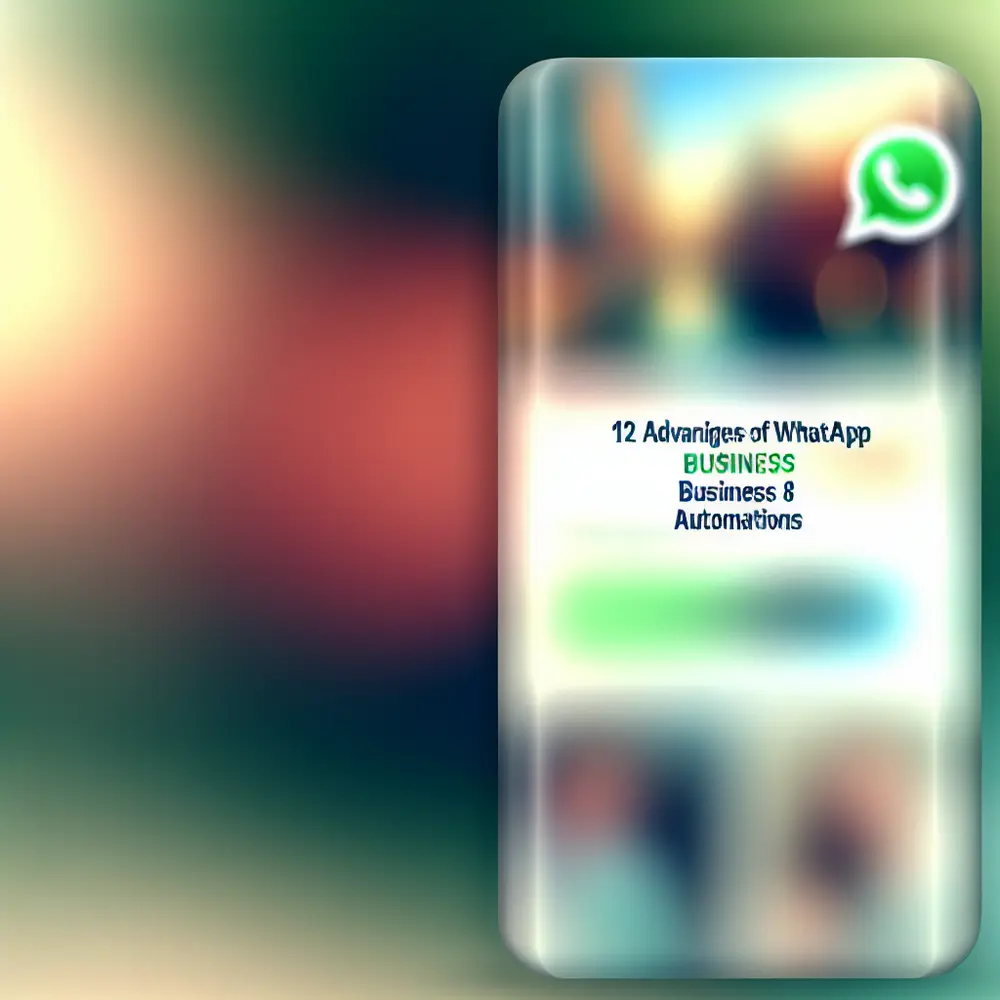In the rapidly evolving landscape of business communication, one tool has emerged as a critical element for enterprises looking to enhance their customer engagement: WhatsApp Business. This specialized version of the widely used messaging app has been designed specifically with the needs of businesses in mind. It equips companies with a suite of features tailored for effective communication, thereby transforming customer service dynamics in today’s digital world. As the lines between business and personal communication blur, understanding the power of WhatsApp Business is vital for any organization aiming to stay connected with its clients while boosting efficiency.
WhatsApp Business is not just another messaging platform; it offers unique features that streamline communication and improve customer satisfaction. With capabilities such as a dedicated business profile, automated messaging, chat organization, and seamless integration with other tools, it empowers businesses to provide immediate and personalized service to their customers. As this article delves into the functionalities and advantages of WhatsApp Business, readers will uncover how to leverage this tool to enhance their customer service experience and drive sales.
However, as with any powerful tool, it’s critical to understand both the benefits and potential drawbacks of using WhatsApp Business. Companies need to be aware of issues surrounding privacy, data security, and the importance of maintaining genuine customer relations in an increasingly automated world. By striking a balance between technology and human interaction, businesses can fully utilize WhatsApp Business as a game-changer in their communication strategies.
WhatsApp Business: A Revolution in Communication
WhatsApp Business is a specialized version of the widely used messaging app designed specifically for enterprises. It offers a suite of tools that enable businesses to communicate effectively with their customers, enhancing the overall customer experience. By leveraging this powerful communication platform, companies can engage with clients in real-time, providing immediate responses to inquiries and facilitating smoother interactions. The introduction of WhatsApp Business marks a significant shift in how businesses approach customer service and sales strategies, catering to the need for more direct and personal communication methods in an increasingly digital world.
One of the primary strengths of WhatsApp Business lies in its ability to streamline communication through features tailored for business needs. Companies can create a dedicated business profile, showcasing essential information such as business hours, location, and product catalogs. This not only enhances credibility but also provides customers with a clearer understanding of the company’s offerings. Automated messaging tools, such as greeting messages and quick replies, further empower businesses to maintain responsive communication, ensuring that no customer query goes unanswered. As a result, the platform has become an indispensable tool for enhancing customer service capabilities in various industries.
Moreover, WhatsApp Business enables organizations to centralize their communication efforts efficiently. Integration with Customer Relationship Management (CRM) systems allows businesses to track customer interactions seamlessly, fostering a more personalized approach to communication. This integration, coupled with the platform’s capability for analytics, gives enterprises valuable insights into customer behavior, helping them refine their strategies and optimize their marketing efforts. By providing personalized experiences and targeted promotions, companies can harness WhatsApp Business to effectively boost sales and customer retention rates.
However, it is essential for business owners and managers to weigh the advantages against the potential drawbacks of using WhatsApp Business. While the platform offers extensive benefits, including cost-effective communication and increased customer engagement, there are considerations regarding privacy, data security, and the proper management of customer expectations. Businesses must ensure they follow best practices in data protection and maintain a balance between automation and genuine customer interaction to build trust and long-term relationships with their clientele. As businesses navigate these challenges, understanding the functionalities and limitations of WhatsApp Business will be crucial to leveraging the platform’s full potential.
Key Features of WhatsApp Business
WhatsApp Business offers a range of key features that cater specifically to the needs of businesses looking to enhance their communication strategies. One of its standout features is the ability to create a comprehensive business profile, enabling companies to showcase essential information such as business hours, website links, and a catalog of products or services. This professional appearance not only lends credibility but also makes it easier for customers to find and engage with a business on a platform they frequently use.
Another significant feature of WhatsApp Business is the automation of communications, which is especially valuable for customer service professionals. Businesses can set up automated greeting messages, quick replies for frequently asked questions, and away messages, significantly streamlining the way queries are handled. This functionality allows businesses to maintain responsiveness and improve customer satisfaction by ensuring that responses are timely and not bottlenecked by human limitations.
Moreover, WhatsApp Business provides the option to classify chats and customers using labels, which helps in organizing interactions efficiently. By categorizing contacts into groups such as leads, customers, and support inquiries, businesses can manage communication more effectively. This ability to categorize conversations not only aids in maintaining a structured approach to customer relationship management but also enhances the personalization of communications, resulting in an improved customer experience.
Lastly, WhatsApp Business integrates seamlessly with third-party tools and enterprise solutions, enhancing its capabilities and providing businesses with a broader communication toolkit. Companies can link their WhatsApp account to Customer Relationship Management (CRM) systems or use the WhatsApp Business API for larger-scale communications, allowing for advanced features like bulk messaging and analytics. This integration not only improves operational efficiency but also enables businesses to gain valuable insights into customer interactions and preferences, assisting in strategic decision-making and overall business growth.
The Benefits of Using WhatsApp Business
WhatsApp Business offers numerous advantages for enterprises seeking to enhance their communication strategies and streamline customer engagement. As a dedicated messaging app for businesses, it enables owners and managers to connect with customers more effectively, harnessing the ubiquity of WhatsApp’s platform, which boasts over 2 billion users globally. This widespread adoption means that businesses can reach their audience where they already spend their time, enhancing engagement and satisfaction.
The first significant advantage of using WhatsApp Business is its ability to facilitate real-time communication. For customer service professionals, this translates to faster response times and improved customer experiences. Features like quick replies and automated messages allow teams to manage inquiries efficiently, ensuring customers receive immediate assistance. This instant communication capability not only boosts customer satisfaction but also elevates the overall brand image, as businesses appear more responsive and attentive to customer needs.
Additionally, WhatsApp Business provides a host of professional features designed specifically for enterprises. Businesses can create a complete profile that includes crucial information such as address, website, and operational hours, giving customers clarity and access to essential details. The platform also supports labeling contacts and chats, allowing sales managers and customer service teams to effectively categorize and prioritize customer interactions. This organization of communications can play a pivotal role in managing workflow, ensuring that follow-ups and important conversations are never overlooked.
Moreover, WhatsApp Business enables robust marketing opportunities. Through the platform, businesses can send targeted promotions, updates, and announcements directly to customers, increasing the likelihood of engagement. The app’s rich media support allows for the inclusion of images, videos, and documents within messages, making marketing efforts more visually appealing and informative. Additionally, businesses can leverage chatbots to handle common inquiries and drive sales, offering a seamless experience that combines automation with personalized communication. In a competitive landscape, utilizing the advantages of WhatsApp Business not only fosters better customer relationships but also drives growth and efficiency within the enterprise.
Challenges and Considerations
The use of WhatsApp Business, while offering numerous advantages for customer engagement and communication, also presents distinct challenges and disadvantages that business owners and professionals should be aware of. One of the primary concerns is the lack of extensive features compared to other communication platforms tailored for enterprises. While WhatsApp Business is a very effective messaging app for direct communication, it may not fulfill the needs of businesses with more complex operational demands. Features such as in-depth analytics, CRM integration, and multi-user capabilities are often limited, which can hinder scalability as a business grows.
Privacy and security are significant issues that must be considered. The potential for data breaches and privacy violations is heightened owing to the app’s encrypted messaging services, which may lead to compliance challenges with data protection regulations. Businesses must carefully manage customer data and ensure that they are following legal requirements, as failing to do so could result in severe legal repercussions and damage to brand reputation.
Additionally, the user experience can vary. Not every customer is accustomed to using WhatsApp as a communication platform for business purposes. Some may prefer traditional channels such as email or phone calls, leading to potential communication gaps. Businesses may face difficulties in converting all customer interactions to the WhatsApp platform, especially if their target audience is less tech-savvy or prefers established methods of communication.
Lastly, the reliance on WhatsApp Business for customer communications means that businesses have little control over the app’s reliability. In instances of app downtime or interruptions to service, businesses may find themselves unable to communicate effectively with their customer base, potentially leading to missed opportunities and dissatisfied customers. This inherent risk emphasizes the necessity for businesses to have alternative communication channels in place to ensure continuity in customer service and support.
WhatsApp Business Compared to Other Messaging Platforms
WhatsApp Business stands out among various messaging apps primarily due to its tailored features that cater specifically to the needs of businesses. Unlike traditional messaging platforms, WhatsApp Business offers tools designed to enhance customer engagement and streamline communication processes. The ability to create a business profile, complete with essential information such as operating hours and catalogs, allows companies to present a professional image. This distinct advantage positions WhatsApp Business as a robust enterprise solution for organizations aiming to improve their customer service and sales strategies.
When comparing WhatsApp Business to other messaging apps like Telegram and Facebook Messenger, one must consider the level of integration and automation it offers. Whereas some platforms may focus primarily on user-generated content, WhatsApp Business facilitates a dual approach: enabling direct two-way communication and providing options for automation. Features like automated replies, quick responses, and organization of chats through labels enhance operational efficiency, minimizing the response time to customer inquiries. This efficiency is particularly critical for sales managers and customer service teams that thrive on timeliness and responsiveness.
Another significant advantage of WhatsApp Business lies in its user base. With over 2 billion active users globally, it is one of the most widely used messaging applications. This extensive reach means businesses can connect with a vast audience without requiring significant investment in customer acquisition strategies. Unlike platforms that may charge businesses for visibility or engagement, WhatsApp Business allows companies to communicate with their existing customer base directly, fostering brand loyalty and encouraging repeat business.
However, despite these advantages, there are limitations to consider. Privacy concerns are paramount when using platforms like WhatsApp, especially in industries that handle sensitive information. While WhatsApp Business employs end-to-end encryption, the potential risks of data breaches and misuse remain. Additionally, businesses must adhere to WhatsApp’s policies, which can sometimes restrict how they engage with customers. In contrast, other messaging platforms might offer more flexibility and features that could better suit certain enterprise needs or marketing strategies.
Best Practices for Implementing WhatsApp Business
Implementing WhatsApp Business in your organization requires strategic planning and adherence to best practices to maximize its benefits. First and foremost, setting up a comprehensive business profile is crucial. This profile should include essential information such as the company’s address, business hours, website link, and a clear description of the services or products offered. A well-structured profile not only establishes credibility but also enhances customer trust from the outset, making it easier for clients to engage with your business.
Next, leveraging automated messaging features can optimize customer interactions significantly. Utilizing automated greetings, away messages, and quick reply templates ensures that customers receive immediate responses, even outside business hours. This instant responsiveness can improve customer satisfaction and engagement, as it meets the growing expectation for timely communication. Additionally, consider implementing labels and categories for customer contacts. This organizational strategy helps maintain clarity, especially as your customer base grows, and allows for more personalized communication tailored to specific groups, enhancing the overall user experience.
Integrating WhatsApp Business with existing CRM systems can further streamline communication processes. By ensuring that all customer interactions through the messaging app are logged and tracked within your CRM, you can create a seamless experience for both staff and customers. This integration enables your sales teams to access previous conversations, aiding in better relationship management and informed decision-making. Furthermore, it can prove invaluable in tracking sales leads and nurturing prospects, ultimately driving revenue growth.
Finally, engaging in proactive communication through WhatsApp Business can set your organization apart. Regularly updating customers with promotional offers, important announcements, and follow-up messages can cultivate a loyal customer base. Crafting tailored marketing campaigns specifically for WhatsApp ensures that your communications remain relevant and valuable, leading to higher engagement rates. By adhering to these best practices, business owners, sales managers, and customer service professionals can harness the power of WhatsApp Business, turning it into an effective communication platform and enterprise solution that fosters growth and enhances customer relationships.
Success Stories Using WhatsApp Business
Businesses around the globe have harnessed the power of WhatsApp Business to transform their communication strategies and drive success. One notable success story is that of a medium-sized retail company that experienced a remarkable increase in customer engagement after integrating WhatsApp Business into their operations. By utilizing this messaging app, they created a direct line of communication with customers, allowing for personalized interactions that were previously unavailable. Customers could easily inquire about products, receive real-time support, and even place orders directly through the app. The result was not only improved customer satisfaction but also a significant boost in sales, with a reported 30% increase in revenue during the first quarter of its implementation.
Another compelling example comes from a service-based business that successfully streamlined its appointment scheduling through WhatsApp Business. By employing the communication platform’s automated messaging features, the company was able to send reminders, confirmations, and even follow-up messages to clients. This proactive communication significantly reduced no-show rates and enhanced overall client retention. Furthermore, the ability to send targeted promotions and offers through the app further engaged customers, leading to a higher conversion rate for repeat business. The strategic use of WhatsApp Business turned a once labor-intensive process into a seamless experience for both the business and its customers.
In the hospitality sector, a boutique hotel leveraged WhatsApp Business to enhance guest experiences. By allowing guests to communicate with staff prior to and during their stay, the hotel could address specific requests and issues in real time, ultimately improving guest satisfaction ratings. Through personalized messaging, the hotel was able to provide tailored recommendations for local attractions and dining options, which not only enriched the guest experience but also encouraged upselling of services. This real-time communication not only elevated customer service but also positioned the hotel as a forward-thinking establishment focusing on guest needs.
Additionally, a growing e-commerce platform successfully utilized WhatsApp Business to facilitate customer support and reduce cart abandonment rates. By integrating the app into their checkout process, customers who encountered issues could receive immediate assistance, allowing them to complete their purchases smoothly. The e-commerce site reported a notable decrease in cart abandonment, with many customers expressing appreciation for the instant support. This use of WhatsApp Business not only streamlined operations but also solidified the platform’s reputation as customer-centric, showcasing how effective enterprise solutions can lead to tangible success in the competitive online retail space.
The Future of WhatsApp Business in Enterprises
The future of WhatsApp Business and messaging in enterprises is poised for transformation as businesses increasingly recognize the value of effective communication platforms. With its massive user base and robust features tailored for business needs, WhatsApp Business continues to evolve, offering companies a powerful messaging app for customer engagement. As remote work becomes more prevalent, organizations will rely heavily on such communication solutions to maintain connections with customers and employees alike.
WhatsApp Business is likely to introduce more integration capabilities with enterprise solutions, reinforcing its position as a core tool for businesses. By connecting with Customer Relationship Management (CRM) systems, analytics tools, and e-commerce platforms, WhatsApp Business can provide a seamless flow of information. This interconnectedness enhances customer interactions, allowing businesses to track engagement and tailor communications based on customer behavior. The growth of artificial intelligence and machine learning is also expected to play a significant role in the messaging landscape, enabling personalized customer experiences and automated support solutions.
Moreover, as enterprises focus on enhancing customer service, the demand for instant messaging apps like WhatsApp Business will increase. Customers crave prompt responses, and using a messaging app facilitates real-time engagement. Businesses will invest in training customer service professionals to harness these tools effectively, ensuring they can provide quick support and resolve issues efficiently. The potential for integration with chatbots and automated responses can further streamline operations, reducing wait times and improving overall customer satisfaction.
In addition to these advancements, privacy and security will remain central themes in the future of WhatsApp Business. With growing concerns around data protection, businesses must adopt best practices for safeguarding sensitive information shared through messaging platforms. WhatsApp’s end-to-end encryption offers a trusted solution, yet companies must remain vigilant and informed about evolving regulations. This focus on security will not only enhance user trust but also position WhatsApp Business as a key player in the enterprise communication sector. Overall, embracing these changes will define how companies leverage WhatsApp Business to drive engagement, streamline operations, and foster growth in the competitive marketplace.
Conclusion
The use of WhatsApp Business presents a multifaceted impact on modern enterprise communication. As a robust messaging app, it streamlines interactions between businesses and their customers, enhancing transparency and immediacy in communication. This communication platform’s user-friendly interface allows businesses to engage effectively across various demographics, fostering personalized customer experiences that can significantly boost satisfaction and loyalty.
However, alongside its numerous advantages, there are notable disadvantages to consider. The reliance on a messaging app can lead to overwhelming volumes of communication, making it difficult for teams to maintain efficiency. Additionally, data privacy concerns and compliance with regulations such as GDPR must be addressed, as they can influence how businesses use WhatsApp Business. Companies must implement clear guidelines to manage communication and protect customer data, ensuring trust and security are prioritized.
From an enterprise solutions perspective, WhatsApp Business facilitates automation and scalability in customer service functions. Features such as automated replies and quick responses allow for prompt communication, which can lead to increased productivity and reduced operational costs. However, over-automation can risk the loss of personal touch that customers often seek; thus, finding the right balance between automation and personal interaction is crucial for maintaining quality service.
In summary, WhatsApp Business offers compelling advantages for businesses seeking to enhance their customer engagement strategies. However, it also necessitates a cautious approach to navigate its downsides effectively. Ultimately, successful implementation requires awareness of both the benefits and challenges, equipping business owners, sales managers, and customer service professionals with the knowledge to leverage this powerful tool while guarding against its potential pitfalls.
For businesses looking to optimize their operations and communication efforts, the integration of a robust CRM for WhatsApp can provide even greater efficacy in managing customer interactions and driving growth.



